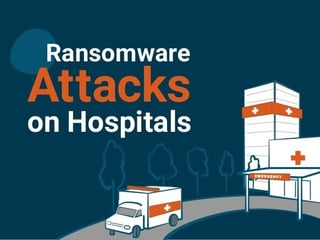 In late October, three of the U.K.’s National Health Service (NHS) hospitals’ computer systems were attacked by malware that forced the hospital to cancel scheduled surgeries and divert trauma patients to other facilities. The hospitals shut down their computer systems in order to fight the virus.
In late October, three of the U.K.’s National Health Service (NHS) hospitals’ computer systems were attacked by malware that forced the hospital to cancel scheduled surgeries and divert trauma patients to other facilities. The hospitals shut down their computer systems in order to fight the virus.
The NHS did not identify the type of malware in the attack, but it was likely a ransomware infection. Organized cybercrime typically targets hospitals, penetrating the whole network and then encrypting as many machines as possible before demanding payment to decrypt the files.
Healthcare Sees 20 Data Loss Incidents PER DAY Due To Ransomware
According to a recent report by Intel Security, the healthcare sector is experiencing over 20 data loss incidents per day related to ransomware attacks. The company said it identified almost $100,000 in payments from hospital ransomware victims to specific bitcoin accounts so far in 2016.
The latest data breach count from the Identity Theft Resource Center (ITRC) reports that there have been 858 data breaches recorded this year through November 8, 2016, and that nearly 30 million records have been exposed since the beginning of the year. The total number of reported breaches increased by 26 since ITRC’s last report on October 19.
The number of breaches in 2015 totaled 781, just two shy of the record 783 breaches that ITRC tracked in 2014. The 809 data breaches reported so far for 2016 are nearly 22% above the number reported (666) for the same period last year. A total of more than 169 million records were exposed in 2015.
Healthcare Staff Lack Basic Cyber Security Awareness
The consequences of a security breach in the healthcare sector can be severe, yet a new survey reveals that healthcare staff are among the most likely to fall victim to social engineering attacks. The study from SecurityScorecard exposes vulnerabilities across 700 healthcare organizations including medical treatment facilities, health insurance agencies and healthcare manufacturing companies. Read about the new research by SecurityScorecard which reveals that healthcare employees lack basic cyber security training on Beta News.
Best Practices for Dealing With Phishing and Ransomware
 Phishing and ransomware are serious problems that can steal data or disable access to your organization's network.
Phishing and ransomware are serious problems that can steal data or disable access to your organization's network.
Both ransomware and phishing are increasingly common and are having devastating impacts on businesses of all sizes.
This new Osterman Research whitepaper gives you a variety of best practices that you should follow in order to minimize your potential for becoming a victim of phishing and ransomware.
Among these best practices are implementing security awareness training as your first line of defense.
Download the whitepaper now:




